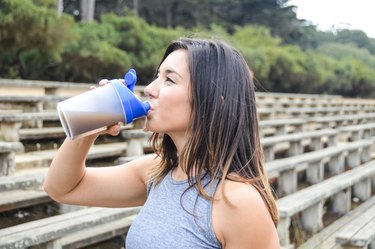
Muscle Milk is a supplemental protein drink marketed by Cytosport, and drinking it immediately after working out is recommended for maximum benefits. It comes in a powdered mix or ready-to-drink bottles and cartons. Cytosport maintains that the product provides energy, lean muscle growth and exercise recovery. One 14 oz. ready-to-drink bottle provides 25 g of protein, and two scoops of the powdered mix provide 32 g of protein. All varieties offer 20 vitamins and minerals. Muscle Milk is a convenient way to meet the serving of protein the International Society of Sports Nutrition recommends you consume around the time of a workout.
Step 1
Choose between the ready-to-drink product or powdered mix. Be aware that if you use the powdered mix you need a shaker bottle and water to prepare it.
Video of the Day
Step 2
Mix one scoop of the powder, if you choose that product, with 5 to 6 oz. of water for 16 g of protein, or mix two scoops with 10 to 12 oz. of water for 32 g of protein. Place the mix and water in a shaker bottle, then shake vigorously for a smooth shake.
Step 3
Drink Muscle Milk immediately after a resistance training workout so you can deliver the amino acids from the protein to muscles when they need it most to repair and recover. Avoid waiting until after you shower or get home.
Things You'll Need
Shaker bottle for powdered mix
Water for powdered mix
Tip
One scoop of powdered Muscle Milk mix contains 150 calories. A shake could contain a significant number of additional calories if you use milk, juice or other ingredients. If you do not want to gain weight, count these calories as part of your overall daily intake. Muscle Milk also comes in a “light” version with fewer calories.
Consuming protein in excess of 30 g may be unnecessary. A study published in the September 2009 issue of the “Journal of the American Dietetic Association” found that consuming more than 30 g of protein in one sitting did not further stimulate muscle growth.
Muscle Milk powder can be mixed with milk to increase calories and add additional protein, calcium, potassium and vitamin D. Using milk also can make the drink creamier and more palatable.
Warning
Muscle Milk is lactose- and gluten-free, but contains whey and casein proteins, which are derivatives of milk. If you have a milk allergy, you should avoid using Muscle Milk. Muscle Milk also contains supplemental vitamins and minerals and added amino acids. The U.S. Food and Drug Administration does not regulate supplements, so consume them at your own risk. You should not use Muscle Milk as your primary source of nutrition.
Video of the Day
- Medicine and Science in Sports and Exercise: "Effects of Supplement Timing and Resistance Exercise on Skeletal Muscle Hypertrophy"; P.J. Cribb, et al.; November 2006
- Journal of the American Dietetic Association; "A Moderate Serving of High-Quality Protein Maximally Stimulates Skeletal Muscle Protein Synthesis in Young and Elderly Subjects"; T. Brock Symons, Ph.D., et al.; September 2009
- Journal of the International Society of Sports Nutrition: "Position Stand: Protein and Exercise"; Bill Campbell, et al.; September 2007
- CBS MoneyWatch: American Fitness: "It's All in the Timing"; Karen Ansel; March-April 2004
- Cytosport: Muscle Milk